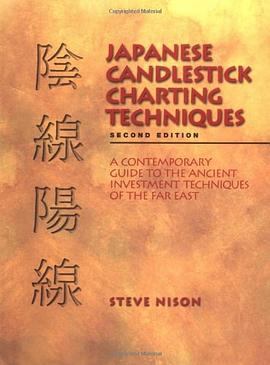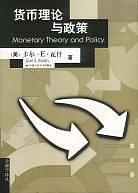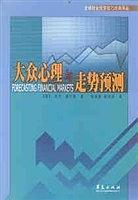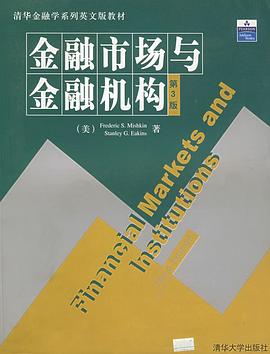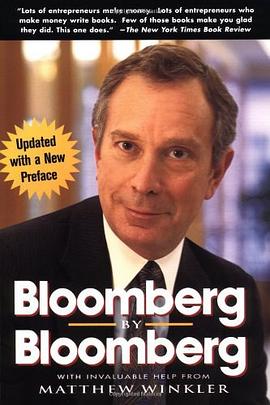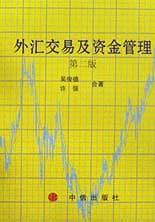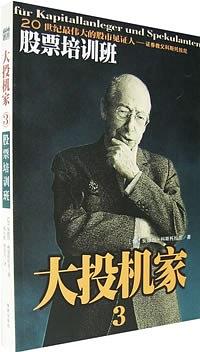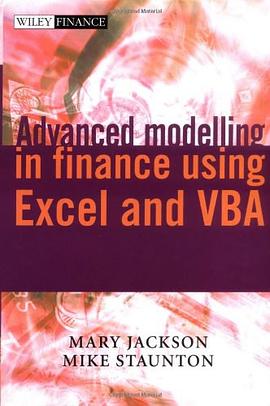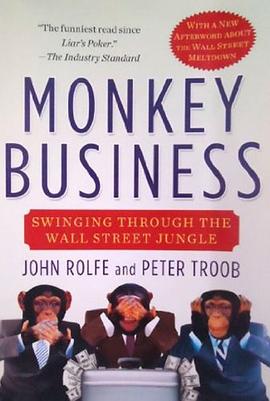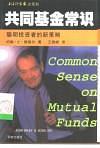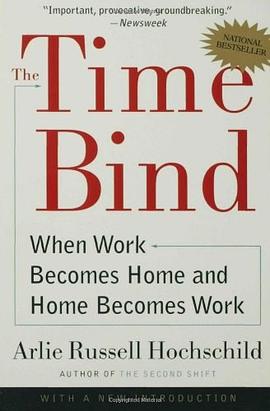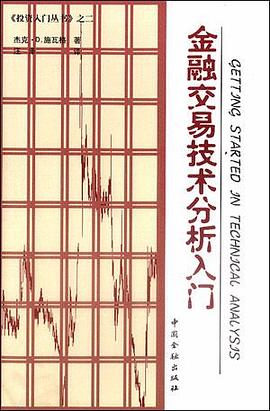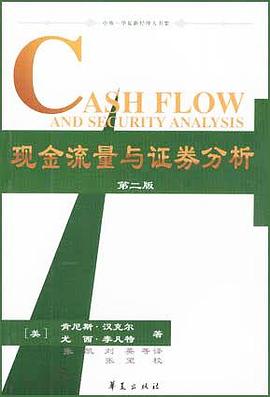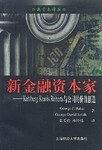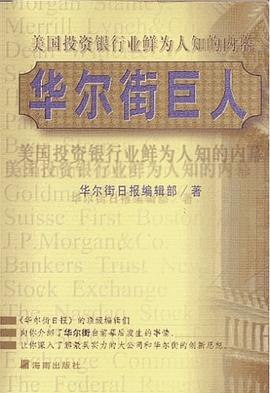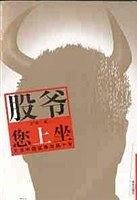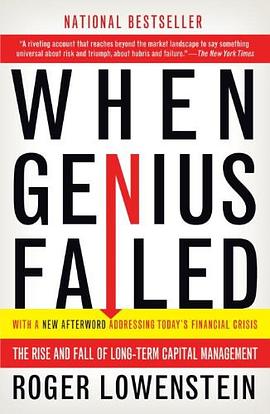

具体描述
On September 23, 1998, the boardroom of the New York Fed was a tense place. Around the table sat the heads of every major Wall Street bank, the chairman of the New York Stock Exchange, and representatives from numerous European banks, each of whom had been summoned to discuss a highly unusual prospect: rescuing what had, until then, been the envy of them all, the extraordinarily successful bond-trading firm of Long-Term Capital Management. Roger Lowenstein's When Genius Failed is the gripping story of the Fed's unprecedented move, the incredible heights reached by LTCM, and the firm's eventual dramatic demise.
Lowenstein, a financial journalist and author of Buffett: The Making of an American Capitalist, examines the personalities, academic experts, and professional relationships at LTCM and uncovers the layers of numbers behind its roller-coaster ride with the precision of a skilled surgeon. The fund's enigmatic founder, John Meriwether, spent almost 20 years at Salomon Brothers, where he formed its renowned Arbitrage Group by hiring academia's top financial economists. Though Meriwether left Salomon under a cloud of the SEC's wrath, he leapt into his next venture with ease and enticed most of his former Salomon hires--and eventually even David Mullins, the former vice chairman of the U.S. Federal Reserve--to join him in starting a hedge fund that would beat all hedge funds.
LTCM began trading in 1994, after completing a road show that, despite the Ph.D.-touting partners' lack of social skills and their disdainful condescension of potential investors who couldn't rise to their intellectual level, netted a whopping $1.25 billion. The fund would seek to earn a tiny spread on thousands of trades, "as if it were vacuuming nickels that others couldn't see," in the words of one of its Nobel laureate partners, Myron Scholes. And nickels it found. In its first two years, LTCM earned $1.6 billion, profits that exceeded 40 percent even after the partners' hefty cuts. By the spring of 1996, it was holding $140 billion in assets. But the end was soon in sight, and Lowenstein's detailed account of each successively worse month of 1998, culminating in a disastrous August and the partners' subsequent panicked moves, is riveting.
The arbitrageur's world is a complicated one, and it might have served Lowenstein well to slow down and explain in greater detail the complex terms of the more exotic species of investment flora that cram the book's pages. However, much of the intrigue of the Long-Term story lies in its dizzying pace (not to mention the dizzying amounts of money won and lost in the fund's short lifespan). Lowenstein's smooth, conversational but equally urgent tone carries it along well. The book is a compelling read for those who've always wondered what lay behind the Fed's controversial involvement with the LTCM hedge-fund debacle. --S. Ketchum
作者简介
Roger Lowenstein (born in 1954) is an American financial journalist and writer. He graduated from Cornell University and reported for the Wall Street Journal for more than a decade, including two years writing its Heard on the Street column, 1989 to 1991. Born in 1954, he is the son of Helen and Louis Lowenstein of Larchmont, N.Y. Lowenstein is married to Judith Slovin.
He is also a director of Sequoia Fund. His father, the late Louis Lowenstein, was an attorney and Columbia University law professor who wrote books and articles critical of the American financial industry.
Roger Lowenstein's latest book, America's Bank: The Epic Struggle to Create the Federal Reserve (The Penguin Press) was released on October 20, 2015.
He has three children and lives in Westfield, New Jersey.
目录信息
读后感
索罗斯曾经说过,凡是人类构建的东西,都有着天然的巨大缺陷。尤其是金融市场,最易出现崩溃。这次美国次贷危机,给他的这一认识提供了最新的佐证,华尔街的最大清算银行贝尔斯登在两周内沦陷,当年每股数百美元的股价今天只能以2美元卖给了摩根,因为摩根认为他的净资产值...
评分金融/投资必读。很多老生常谈的道理,读LTCM rise and fall的真实故事更有真切感受。三个让我回味的教训: 1) Markets can stay irrational longer than you can remain solvent. 即便你能正确判断市场出错并采取行动,市场回归正确的时间可能抹平你的收益、回归正确的起伏过程...
评分 评分 评分用户评价
我之所以对《When Genius Failed》这本书如此着迷,完全是因为它所承诺的深刻洞察。在我看来,“天才”这个词往往被赋予了过于理想化的光环,而这本书的标题则直接揭示了其反面——当这份超凡的智慧,遭遇现实的严峻考验时,会发生什么?我非常期待作者能够带领我,深入探究那些导致“天才”失败的根本原因。这可能涉及到市场格局的突变,也可能是企业内部的管理问题,甚至可能只是一个被忽视的细节,最终引发了连锁反应。我希望这本书不仅仅是罗列事实,更能提供一种独特的视角,去理解那些曾经的辉煌是如何被蚕食殆尽的。我想看到那些决策者在面临巨大压力时的内心挣扎,以及他们是如何一步步走向深渊的。这不仅仅是一个关于商业失败的故事,更可能是一次关于人类认知边界、决策机制以及外部环境影响的深刻反思。我迫不及待地想知道,那些“天才”究竟在什么时候、因为什么而“失败”了。
评分"When Genius Failed"这个书名,就好像一个充满悬念的戏剧预告,瞬间点燃了我对故事的好奇心。它预示着,即将展现在我面前的,不是一路顺风顺水的成功传奇,而是那些曾经熠熠生辉的天才,在某个无法挽回的时刻,所遭遇的滑铁卢。我总是对那些“为什么”感到着迷,为什么那些被公认为拥有超凡智慧的人,会做出看似简单却又致命的错误?是因为他们过于自信,看不到潜在的风险?还是因为他们所处的时代,信息不对称,导致他们做出了基于错误信息的判断?我希望这本书能深入挖掘那些隐藏在公众视野之外的细节,披露那些不为人知的幕后故事。或许,我们会发现,天才的陨落,并非源于一次偶然的失误,而是多种因素相互作用的结果,是宏观环境的变化,是人性的弱点,是不可预测的命运,共同编织成了一张致命的网。我期待通过这本书,能够更全面地理解“失败”的意义,以及它在天才成长道路上所扮演的复杂角色。
评分这本书的名字实在太吸引人了,"When Genius Failed",光是这个标题就足以让我产生无限的遐想。我一直对那些曾经站在时代顶峰,却最终走向没落的天才人物的故事充满好奇。他们的辉煌,他们的失足,都仿佛是一面面棱镜,折射出人性的复杂与命运的无常。我期待在这本书中,能看到对那些曾经光芒万丈,最终却阴沟里翻船的智者们的深度剖析。不仅仅是他们的成就,更重要的是他们失败的原因。是什么样的决策失误?是心态的膨胀,还是外部环境的巨变?抑或是难以预料的黑天鹅事件?我希望作者能够挖掘出那些不为人知的细节,将故事抽丝剥茧,让我们得以一窥他们脑海深处的思绪,以及导致他们陨落的那些关键性时刻。这本书的封面设计也给我留下了深刻的印象,那种略带忧郁的色调,仿佛预示着一个充满悲剧色彩的故事即将展开。我迫不及待地想翻开它,跟随作者的笔触,一同经历那些令人扼腕的时刻,感受那种从云端跌落的震撼。这不单单是一个关于失败的故事,更是一个关于人性、野心、以及我们对“天才”这一概念深刻反思的契机。
评分这本书的标题,"When Genius Failed",总让我联想到那些在商业战场上叱咤风云,却最终因为一个错误的判断而跌入谷底的传奇人物。想象一下,一个曾经被誉为天才的商业领袖,其远见卓识,其商业头脑,曾经引领着一个帝国走向辉煌。然而,在某个时刻,他的决策出现了偏差,或者说,他所处的环境发生了不可逆转的变化,使得曾经无比正确的战略瞬间变得站不住脚。我非常想知道,在那个关键的转折点,他究竟经历了怎样的挣扎?是固执己见,不愿承认错误?还是低估了竞争对手的实力,亦或是对市场的变化反应迟钝?书名本身就带有一种宿命论的色彩,暗示着即使是最聪明的人,也无法完全掌控命运的潮汐。我期待作者能够以一种史诗般的笔触,描绘出这些人物在辉煌与没落之间的心理落差,以及他们所面临的巨大压力。或许,这本书不仅仅是关于商业的案例分析,更是一次对人类认知局限性的深刻探讨。我准备好迎接那些震撼人心的故事,以及那些发人深省的教训。
评分“When Genius Failed”——这个书名,像一把钥匙,打开了我对那些曾经站在世界之巅,却最终跌落凡尘的天才人物的无限想象。我一直对这种“高处不胜寒”的境遇充满着探究的欲望。那些被大众奉为神明的人物,他们的智慧如同璀璨的星辰,照亮了一个时代。然而,当他们犯下错误,当他们的光芒黯淡,那种失落感和震撼感,往往比一帆风顺的成功更加引人深思。我迫切地想知道,在那些“天才”陨落的时刻,究竟发生了什么?是他们自身的傲慢,还是外部环境的不可抗拒?是决策上的盲点,还是对风险的低估?我期待在这本书中,能看到作者用生动的笔触,还原那些惊心动魄的瞬间,揭示那些隐藏在光鲜外表之下的脆弱。这不仅仅是对失败的记录,更可能是一次对人性、对成功与失败之间微妙界限的深刻反思。我准备好迎接那些令人扼腕的故事,以及它们所带来的对“天才”定义的重新审视。
评分我觉得还蛮好看的欧!描写银行们的那一part堪称搅屎棍比武大会!
评分后人哀之而不鉴之,亦使后人而复哀后人也
评分与08年的危机相比,LTCM的破产只不过是金融市场上很快会被人遗忘的一个小插曲。不过Merton和Scholes的参与还是让它有了独特的讽刺意义:1997年两人因为金融的贡献得诺奖,1998年LTCM被bailout。
评分An epic account of how the legendary LTCM, an investment Dream Team led by a hero of the Liar's Poker, quickly rose to stardom with its computerised and mathematics-based investment models, only to find itself lose it all in five weeks amid irrational market conditions, due to lax governance, excessive leverage and inherent flaws of the models.
评分波澜壮阔
相关图书
本站所有内容均为互联网搜索引擎提供的公开搜索信息,本站不存储任何数据与内容,任何内容与数据均与本站无关,如有需要请联系相关搜索引擎包括但不限于百度,google,bing,sogou 等
© 2026 book.quotespace.org All Rights Reserved. 小美书屋 版权所有

